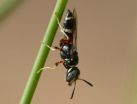(Press-News.org) It's a hard pill to swallow, but if you're over 24 years of age you've already reached your peak in terms of your cognitive motor performance, according to a new Simon Fraser University study.
SFU's Joe Thompson, a psychology doctoral student, associate professor Mark Blair, Thompson's thesis supervisor, and Andrew Henrey, a statistics and actuarial science doctoral student, deliver the news in a just-published PLOS ONE Journal paper.
In one of the first social science experiments to rest on big data, the trio investigates when we start to experience an age-related decline in our cognitive motor skills and how we compensate for that.
The researchers analysed the digital performance records of 3,305 StarCraft 2 players, aged 16 to 44. StarCraft 2 is a ruthless competitive intergalactic computer war game that players often undertake to win serious money.
Their performance records, which can be readily replayed, constitute big data because they represent thousands of hours worth of strategic real-time cognitive-based moves performed at varied skill levels.
Using complex statistical modeling, the researchers distilled meaning from this colossal compilation of information about how players responded to their opponents and more importantly, how long they took to react.
"After around 24 years of age, players show slowing in a measure of cognitive speed that is known to be important for performance," explains Thompson, the lead author of the study, which is his thesis. "This cognitive performance decline is present even at higher levels of skill."
But there's a silver lining in this earlier-than-expected slippery slope into old age. "Our research tells a new story about human development," says Thompson.
"Older players, though slower, seem to compensate by employing simpler strategies and using the game's interface more efficiently than younger players, enabling them to retain their skill, despite cognitive motor-speed loss."
For example, older players more readily use short cut and sophisticated command keys to compensate for declining speed in executing real time decisions.
The findings, says Thompson, suggest "that our cognitive-motor capacities are not stable across our adulthood, but are constantly in flux, and that our day-to-day performance is a result of the constant interplay between change and adaptation."
Thompson says this study doesn't inform us about how our increasingly distracting computerized world may ultimately affect our use of adaptive behaviours to compensate for declining cognitive motor skills.
But he does say our increasingly digitized world is providing a growing wealth of big data that will be a goldmine for future social science studies such as this one.
INFORMATION:
Simon Fraser University is consistently ranked among Canada's top comprehensive universities and is one of the top 50 universities in the world under 50 years old. With campuses in Vancouver, Burnaby and Surrey, B.C., SFU engages actively with the community in its research and teaching, delivers almost 150 programs to more than 30,000 students, and has more than 125,000 alumni in 130 countries.
Simon Fraser University: Engaging Students. Engaging Research. Engaging Communities.
Contact:
Joe Thompson (White Rock resident), 604.367.7497 (cell), jjthomps@sfu.ca
Mark Blair (Burnaby resident), 604.562.4963, mblair@sfu.ca
Andrew Henrey, (Langley resident), 778.235.9147, ajh5@sfu.ca
Carol Thorbes, PAMR, 778.782.3035, cthorbes@sfu.ca
Study says we're over the hill at 24
2014-04-14
ELSE PRESS RELEASES FROM THIS DATE:
Lashing out at your spouse? Check your blood sugar
2014-04-14
COLUMBUS, Ohio – Lower levels of blood sugar may make married people angrier at their spouses and even more likely to lash out aggressively, new research reveals.
In a 21-day study, researchers found that levels of blood glucose in married people, measured each night, predicted how angry they would be with their spouse that evening.
At the end of the 21 days, people who had generally lower levels of glucose were willing to blast their spouses with unpleasant noises at a higher volume and for a longer time than those who had higher glucose levels.
The study shows how ...
Ferns borrowed genes to flourish in low light
2014-04-14
DURHAM, N.C. -- During the age of the dinosaurs, the arrival of flowering plants as competitors could have spelled doom for the ancient fern lineage. Instead, ferns diversified and flourished under the new canopy -- using a mysterious gene that helped them adapt to low-light environments.
A team led by Duke University scientists has pinpointed the curious origins of this gene and determined that it was transferred to ferns from a group of unassuming moss-like plants called hornworts. The findings were announced today, April 14, in the Proceedings of the National Academy ...
Plugging an ozone hole
2014-04-14
CAMBRIDGE, Mass-- Since the discovery of the Antarctic ozone hole, scientists, policymakers, and the public have wondered whether we might someday see a similarly extreme depletion of ozone over the Arctic.
But a new MIT study finds some cause for optimism: Ozone levels in the Arctic haven't yet sunk to the extreme lows seen in Antarctica, in part because international efforts to limit ozone-depleting chemicals have been successful.
"While there is certainly some depletion of Arctic ozone, the extremes of Antarctica so far are very different from what we find in the ...
Fire and drought may push Amazonian forests beyond tipping point
2014-04-14
Falmouth, Mass. – Future simulations of climate in the Amazon suggest a longer dry season leading to more drought and fires. Woods Hole Research Center scientists Michael Coe, Paulo Brando, Marcia Macedo and colleagues have published a new study on the impacts of fire and drought on Amazon tree mortality. Their paper entitled “Abrupt increases in Amazonian tree mortality due to drought-fire interactions,” published in the Proceedings of the National Academy of Sciences, found that prolonged droughts caused more intense and widespread wildfires, which consumed more forests ...
Faithful allies since the Cretaceous
2014-04-14
Like humans, many animals depend on beneficial microbes for survival. Although such symbioses can persist for millions of years, the factors maintaining their long-term stability remain, in most cases, unknown. Scientists from the Max Planck Institute for Chemical Ecology and the University of Regensburg, in collaboration with researchers in the USA, now discovered that certain wasps tightly control mother-to-offspring transmission of their bacterial symbionts. This stabilizes the symbiotic alliance and contributed to its persistence over the past 68-110 million years. ...
'Problem wells' source of greenhouse gas at unexpected stage of natural gas production
2014-04-14
WEST LAFAYETTE, Ind. - High levels of the greenhouse gas methane were found above shale gas wells at a production point not thought to be an important emissions source, according to a study jointly led by Purdue and Cornell universities. The findings could have implications for the evaluation of the environmental impacts from natural gas production.
The study, which is one of only a few to use a so-called "top down" approach that measures methane gas levels in the air above wells, identified seven individual well pads with high emission levels and established their stage ...
Penicillin redux: Rearming proven warriors for the 21st century
2014-04-14
Penicillin, one of the scientific marvels of the 20th century, is currently losing a lot of battles it once won against bacterial infections. But scientists at the University of South Carolina have just reported a new approach to restoring its combat effectiveness, even against so-called "superbugs."
Bacteria have been chipping away at the power of the penicillin family of drugs since their first wide-scale use as antibiotics in the 1940s. For example, the staph infection, brought about by the bacterium Staphylococcus aureus, was once readily treated with penicillin and ...
Study links severe sleep apnea to increased risk of stroke, cancer and death
2014-04-14
DARIEN, IL – A new study shows that moderate to severe obstructive sleep apnea is independently associated with an increased risk of stroke, cancer and death.
Results of the 20-year follow-up study show that people with moderate to severe obstructive sleep apnea were four times more likely to die (hazard ratio = 4.2), nearly four times more likely to have a stroke (HR = 3.7), three times more likely to die from cancer (HR = 3.4), and 2.5 times more likely to develop cancer. Results were adjusted for potential confounding factors such as body mass index, smoking status, ...
Shared decision making during radiation therapy improves patient satisfaction
2014-04-14
PHILADELPHIA—Playing an active role in their radiation treatment decisions leaves cancer patients feeling more satisfied with their care, and may even relieve psychological distress around the experience, researchers from the Perelman School of Medicine at the University of Pennsylvania report in the journal Cancer.
In a study of 305 patients undergoing radiation treatment, Neha Vapiwala, MD, an associate professor in the department in Radiation Oncology at Penn Medicine, and colleagues at link "Penn's...Center: Penn's Abramson Cancer Center found an association between ...
Plague alters cell death to kill host
2014-04-14
Northwestern Medicine scientists are continuing to unravel the molecular changes that underlie one of the world's deadliest and most infamous respiratory infections.
When the bacterium Yersinia pestis enters the lungs, it causes pneumonic plague, a disease that is 100 percent fatal if untreated. The way in which Y. pestis evades the immune system and kills people in a matter of days has largely confounded scientists, until now.
Following a 2007 study demonstrating that the presence of a protein called the plasminogen activator protease (Pla) is required for Y. pestis ...





